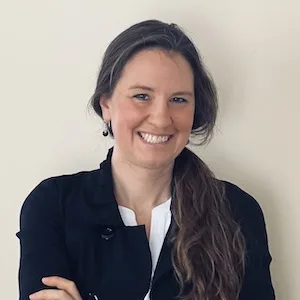
Dartmouth’s Robert McRae III (23) takes a pass from Jackson Munro (33) as Duke’s Jaylen Blakes (2) defends during the second half of an NCAA college basketball game in Durham, N.C., Nov. 6, 2023. A National Labor Relations Board regional official has decided that Dartmouth basketball players are employees of the school, clearing the way for an election that would create the first-ever labor union for NCAA athletes. (AP Photo/Ben McKeown, File)
Cade Haskins, a Dartmouth College basketball player in his junior year at Dartmouth College, said his sport requires about 20 hours of work a week, including attending practices, meetings, reviewing film, and working out.
And yet, he’s not considered an employee.
Haskins, 21, is trying to change that. He was one of 15 players who filed a petition with the National Labor Relations Board (NLRB) in September, claiming he is an employee of the college and has a right to form a union. Doing so would allow students to negotiate salaries and working conditions, like practice hours and travel.
All 15 members of the Dartmouth men’s basketball team asked to join Local 560 of the Service Employees International Union, based in Concord.
The players said they only get one day of work off a week during basketball season and are expected to work out during the off season. Though not paid in dollars, the athletes receive free apparel, meals, travel, accommodations, free equipment, room and board for part of the year, free tickets to games, and footwear “in excess of thousands of dollars.”
The students’ schedules are dictated by coaches, who direct students not to take classes at times that conflict with practices. The players are also reprimanded or humiliated for missing events.
“The college exercises unilateral control of the players’ hours of work, such as practices, off season conditioning, weight lifting, competitions and interaction with fans and alumni,” a brief filed with the NLRB in October said. “The college also exercises control over other aspects of the players off court behavior such as travel plans, meals. The college maintains this control through the use of discipline, physical exertion, a.k.a corporal punishment, public shaming and the withholding of participation in practices and competitions.”
The athletes also get an early look at their financial aid packages from Dartmouth prior to graduating from high school.
Haskins said in testimony before the hearing, he received his financial package in the summer before his senior year of high school. He was informed in September of his senior year that he was “likely” to be admitted to Dartmouth and he accepted the offer. Haskins was informed he had to commit to Dartmouth exclusively and could not complete applications for other colleges.
In addition, the players’ names, images, and likenesses (NIL) are controlled by the college, and governed under a contract.
“If you don’t sign you don’t practice and if you don’t practice you don’t play,” Haskins said in testimony.
A National Labor Relations Board agreed with the students in a Monday ruling, claiming the athletes are employees.
Dartmouth College athletes could become the first in the country to have a labor union for NCAA athletes, pending an election.
“Because Dartmouth has the right to control the work performed by the Dartmouth men’s basketball team, and the players perform that work in exchange for compensation, I find that the petitioned-for basketball players are employees within the meaning of the (National Labor Relations) Act,” NLRB Regional Director Laura Sacks wrote in the ruling.
Dartmouth basketball player representatives Haskins, from Minnesota, and Romeo Myrthil, a junior guard from Sweden, called the ruling “a significant step forward for college athletes,” in a statement, adding, “we are excited to see how this decision will impact college sports nationwide.”
“We believe that other athletes will recognize the opportunities this ruling presents and will be inspired to follow suit,” the statement said. “This association aims to foster unity, advocate for athletes’ rights and well-being, and create a platform for collaborative decision-making. We look forward to working with our fellow Ivy League athletes to bring positive change to the landscape of college sports and the Ivy League.”
The fight might not be over as Diana Lawrence, the Dartmouth College’s associate vice president for communications, said the school will appeal the decision.
“We believe firmly that unionization is not appropriate in this instance and we will be seeking a review of the decision the regional director issued on Feb. 5,” Lawrence said in a statement. “Unlike other institutions where athletics generates millions of dollars in net revenue, the costs of Dartmouth’s athletics program far exceed any revenue from the program—costs that Dartmouth bears as part of our participation in the Ivy League. We also do not compensate our athletes, nor do we provide athletic scholarships; all scholarships are based on financial need.”
Lawrence’s sentiment mirrors those made from the college in a four-day hearing in October. Dartmouth argued that the players shouldn’t be considered employees because athletics are part of the academic mission of the school, like performing in the orchestra or playing club sports.
“At Dartmouth, students’ primary objective is learning,” school attorney Joe McConnell said, according to the post-hearing brief. “Dartmouth has adopted policies reflecting that students who participate in intercollegiate athletics are students first and athletes second.”
The college provided a chart showing the basketball program lost $855,369 in 2023.
Lawyers for the basketball team countered that, claiming the players “perform services for Dartmouth which generates revenue, prestige, alumni support and positive impact on reputation,” which leads to financial donations.
Lawyers for the team argued the men’s program is the second largest generator of revenue for Dartmouth, behind football.
“Football and basketball revenue accounts for almost half of all revenue generated by the over 30 men’s varsity sports in the Dartmouth athletic program,” the lawyers said in a summary of the October hearing.
The Dartmouth case is being closely watched across the country. It’s coming at a time when the NCAA’s athlete model is facing multiple challenges in court.
The NCAA and universities across the country have insisted their athletes are students, not employees. College sports leaders have even lobbied Congress for a federal law that would codify that classification as the NCAA faces a federal lawsuit in Pennsylvania.
“It’s the first step to potential employee status for college athletes,” Gabe Feldman, a sports law professor at Tulane University in New Orleans, told the Associated Press.
Editor’s note: Information from the Associated Press was used in this report.
Politics

Biden makes 4 million more workers eligible for overtime pay
The Biden administration announced a new rule Tuesday to expand overtime pay for around 4 million lower-paid salaried employees nationwide. The...

Biden administration bans noncompete clauses for workers
The Federal Trade Commission (FTC) voted on Tuesday to ban noncompete agreements—those pesky clauses that employers often force their workers to...
Local News

VIDEO: Manchester Police investigate a shooting at the Mall of New Hampshire on Sunday, April 21, 2024
Manchester Police are investigating a reported shooting in the parking lot of the Mall of New Hampshire on Sunday, the police said in a post on X....

6 fun Earth Day events in NH
Since it began 54 years ago, Earth Day has become more and more of an important occasion that is meant to be fun, but also to give people...





